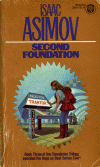I’ve been meaning to read Flatland by Edwin A. Abbott for some time now. I’ve seen it lying around the house here and there for many years. My wife actually acquired this book as part of her required reading for a “Sensation and Perception” course in college. I ran across it again when packing up my Asimov collection to bring up to my sister in Minneapolis. It was a short read, which was refreshing after some of the longer books I’ve been tackling recently.
The main character, and narrator, is a Square in a 2D world dubbed Flatland. The basics of Flatland society are laid out in a rather matter-of-fact way that bleeds of satire. Essentially, the higher up in society, the more sides you have. Women of course are just lines (actually just VERY skinny squares), and the leader of Flatland is very nearly, but not quite a perfect Circle. In addition to the number of sides, the symmetry of angles is of utmost importance. It was amusing to read of dangerous operations that parents would subject their children to in order to correct some not so optimal angles, even though they could be fatal. The parents figured it would was best to be dead than “irregular.”
Utilizing humor and social satire, Abbot clearly explains the workings of this odd 2D world. I found myself coming up with questions about how such a world would work, then just a page or two later found them explained. He goes through the Square’s vision/dream of a land called Lineland, and again of Pointland. Soon after this, the Square is approached by a very peculiar circle that calls itself a Sphere from Spaceland. It tries to convince Square that he comes from a land of three dimensions.
It seemed natural that the logical progression of explanation could follow past to the fourth dimension and beyond. Abbot briefly extrapolates from previous explanations to touch on higher dimensions, but it seemed very hard to grasp. I think one of the main points of the book is to demonstrate how easily it is to understand lower dimensions, and also how hard it is to contemplate anything above our current experiences. Overall, I was very pleased with this book. The chapters are very short and well organized. I’d highly recommend this for any reader, especially those that like geometry.




one of my favourite books ever.